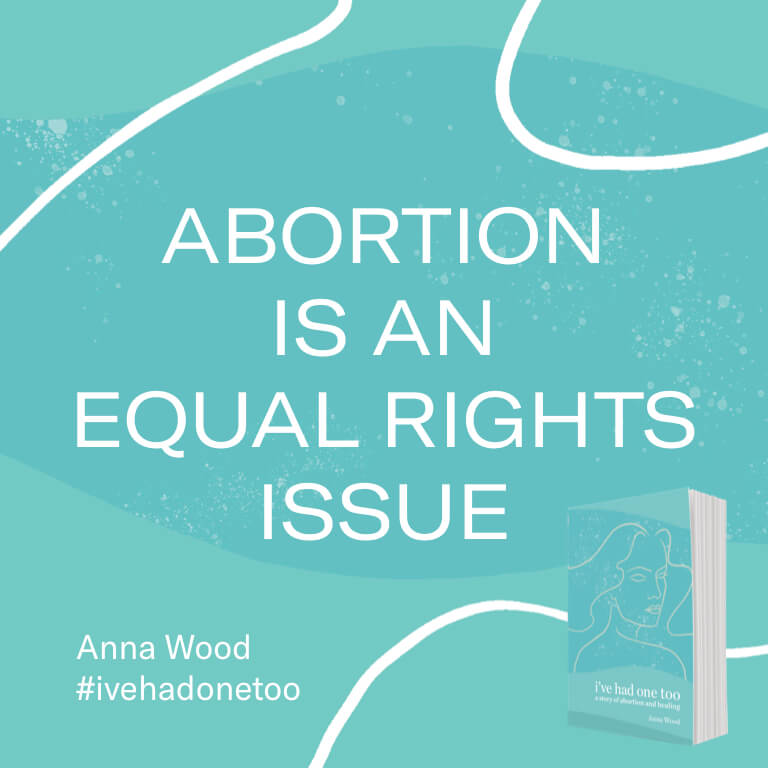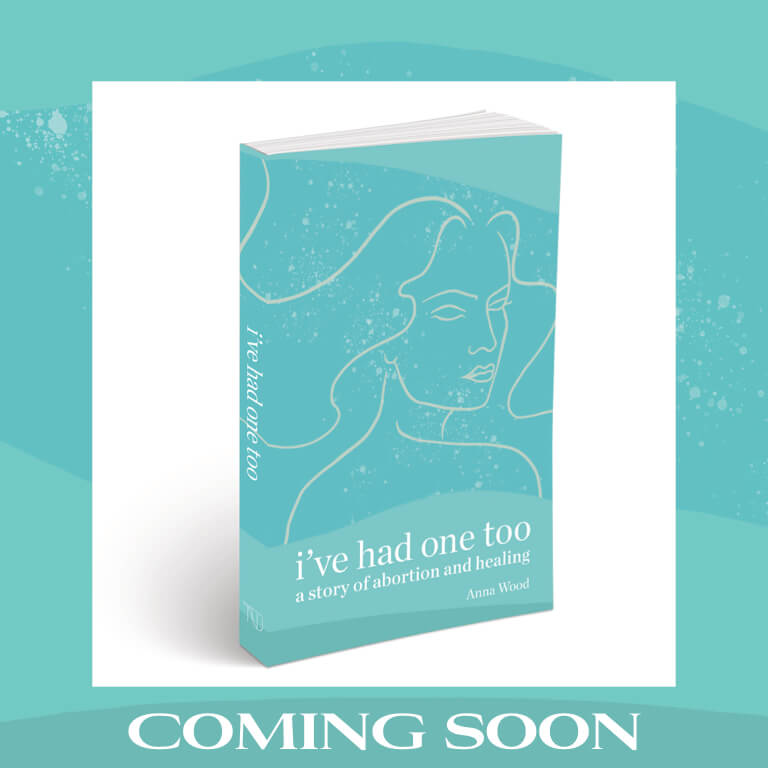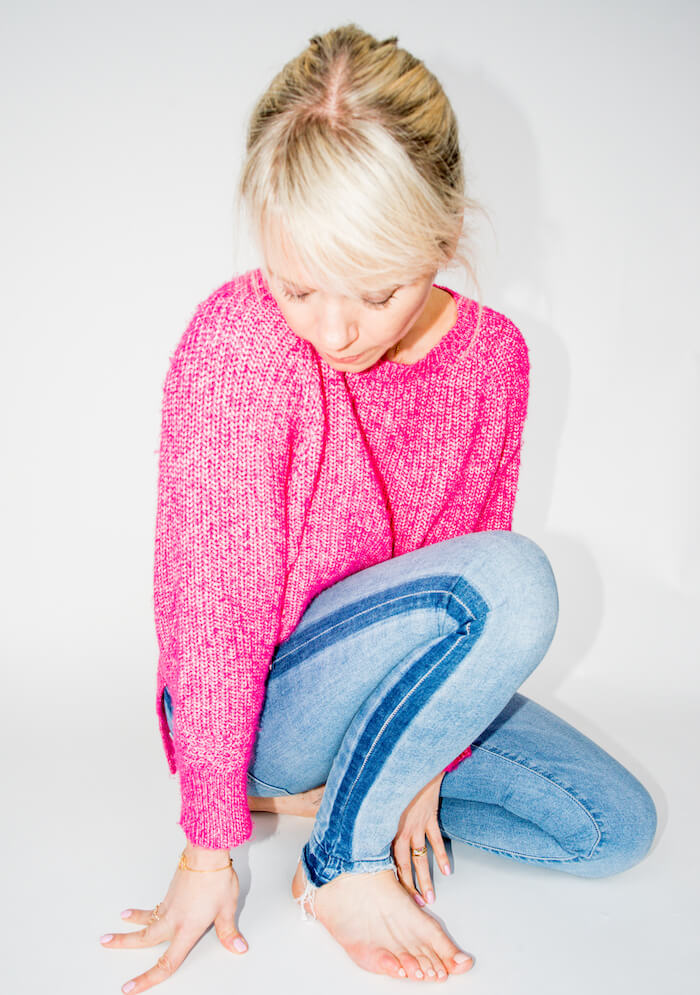In this excerpt from her new memoir, I’ve Had One Too, Anna Wood explains why a abortion is an issue of equality …

IN THIS POLITICALLY-VOLOTILE, EVER-CHANGING, REACTIVE, RELIGIOUS, and emotionally stunted world of ours, a lot of people still seem to think the “answer” to abortion is to control women’s bodies. And as much as a world without abortion would be ideal, it is doubtful that the need for this procedure will ever go away—and certainly not because of a bunch of laws made by privileged, white men.
Further, Katha Polit, in Reclaiming Abortion Rights, explains that reproductive rights “are not a distraction from the important, economic issues. They are an economic issue: without the ability to limit and time their pregnancies, women will always be disadvantaged at work and subordinate to men.” Simply put, abortion allows women “to only have children they want and can raise well.”
For women to truly achieve economic equality, both men and women need to have equal stakes in child raising. Ideally, this would mean equal, paid, parental leave from work, as in Sweden, where parents are given a total of 480 days to split between them, of which 90 each go to the man or woman exclusively and cannot be transferred to the other partner.
As long as women are unable to plan their pregnancies, and men are not given more time off to care for children, women will fall behind at work and remain disadvantaged in the workplace. The secondary effect of this is that ultimately women will remain economically behind, which means we will continue to depend on men to some degree.
As long as there are unwanted pregnancies (remember, that’s 50 percent of all pregnancies in the US), women should have the right to do as they need—for their futures, for their bodies, and for their own security. How can it be right that this decision is forced on us by lawmakers and politicians, who know and care nothing for the individual circumstances of the human lives at stake?
The unborn children of abortion—the lives that are at the real heart of this issue—must also be counted in this equation. How many unplanned for children are born into lives of seemingly intractable inequality? When the Alabama Human Life Protection Act was signed in 2019, Governor Kay Ivy ended her statement on the draconian law (which aims for a near wholesale ban on abortion): “We must give every person the best chance for a quality life and a promising future.”
No matter that Alabama is the sixth poorest state in the US, with 17.2% of Alabamians living below the poverty line (the national average is 14%). Given that the people most likely to be affected by this law are also the poorest—those who lack widespread access to healthcare and birth control, leading them to abortion in the first place—many souls entering the world as a result of this bill will be pre-destined for a life of poverty-induced suffering.
///
And then there is the complicated, often contradictory debate about the role of race in abortion. In a New York Times article from 2019, John Eligon says, “(Some of) Those seeking to outlaw abortion lament what they see as an undoing of the fabric of Black families. They liken the high abortion rates among Black women to a cultural genocide, and sometimes raise the specter of eugenics and population control when discussing abortion rights.”
The article goes on to interview a reverend and a minister, both of whom are pro-life from a religious standpoint, but remain pro-choice politically. They are in lockstep with those opposing the Alabama Human Life Protection Act: that we as a society need to provide a life where women and children can thrive, “from womb to tomb.” A promise that bypasses communities of color in the US, where families are disproportionately impacted by poverty, mass incarceration, and institutionalized police brutality.
Now imagine a world where birth control is not only universally available, but exists in equal, effective measure for both sexes. And while we’re here, let’s expand this to envision a world where people of color no longer face the oppression and prejudice that results in racial violence and stereotyping at every turn. Where the a person’s gender identity does not impact their right to an opinion or a voice, giving women and non-binary individuals an equal say in how the world works.
Where, on a wider level, we recognize ourselves and our sexuality as a part of nature—our thriving on par with the lives of nonhuman animals and the earth itself. In a world where all beings truly are “equal,” would there be less anger and violence and hatred overall? Would incidences of emotional abuse and manipulation, domestic violence, and rape decrease, leading to fewer unplanned pregnancies and, ultimately, fewer abortions?
I still don’t know where my decision to terminate my pregnancy fits into this picture. Although I am white and heterosexual, I am a member of an oppressed class (a woman); and yet I made a decision for a nascent life that had no voice of its own. Does this make me the oppressor? Maybe. Or maybe by making a choice for the better of my own future—one that did not result in bringing a child into a familial pattern of emotional abuse—my decision will leave the world a little bit better off.
I think about an alternate universe in which I had kept my pregnancy and found myself the mother of a person of color. It makes me recall so many small moments with the broker’s family that were heart-wrenching: his seven-year-old twin nieces being teased at school for having dark hair on their faces; his ten-year-old nephew being told he wasn’t allowed to wear a hoodie out of the house.
But he’s just a child, I said to the broker. He shrugged—this was just the way of the world. I wanted to cry, to rage against a system that threatened the safety of any child, but it didn’t feel like my place. It felt like it was his grief, and I was on the outside.
Would my child have been “disadvantaged” like my friend was inclined to believe? Probably, yes. They would have faced an uphill battle in a system built to keep people of color oppressed. But just because society doesn’t respect the value of a person’s life, doesn’t mean that value is negated.
I would not have been able to protect my child from everything—no parent can. But my child would have been loved, by me and by my family. I would have done everything I could to make them know their value, as my parents did for me. In the end, this is the only shield we can offer in a world as violently oppressive to people of colors as ours.
I’ve Had One Too: A Story of Abortion and Healing by Anna Wood is out now with Numinous Books. Click HERE to get your copy.



